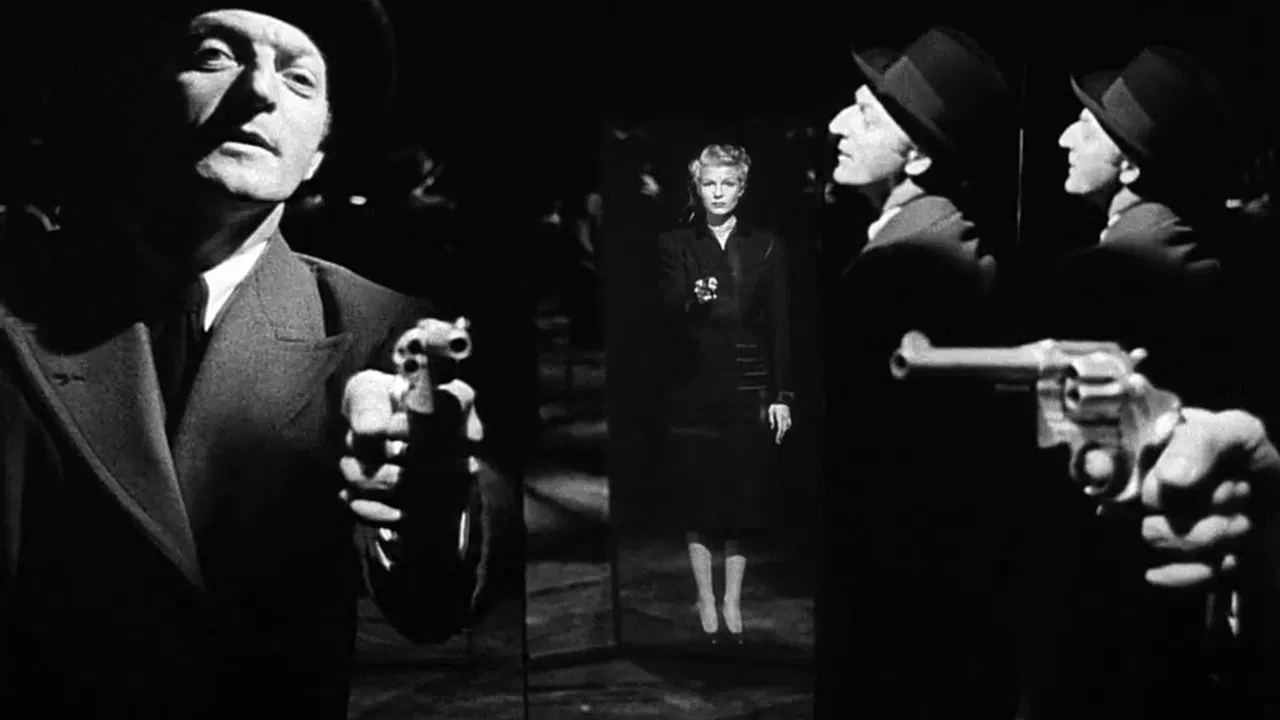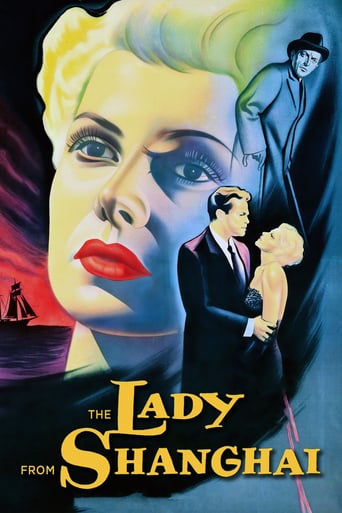

I think this is a new genre that they're all sort of working their way through it and haven't got all the kinks worked out yet but it's a genre that works for me.
... View MorePretty good movie overall. First half was nothing special but it got better as it went along.
... View MoreIt isn't all that great, actually. Really cheesy and very predicable of how certain scenes are gonna turn play out. However, I guess that's the charm of it all, because I would consider this one of my guilty pleasures.
... View MoreI think this is a new genre that they're all sort of working their way through it and haven't got all the kinks worked out yet but it's a genre that works for me.
... View MoreRevered as an exemplary film-noir by today's cinephiles and critics, THE LADY FROM SHANGHAI was a calamitous project of prodigy Welles battling with Hollywood studio system, so much so that its behind-the-scene anecdotes (including the fickle relationship with his then wife Hayworth, they divorced in 1948) have somewhat eclipsed the film itself.The plot is rather convoluted considering that there are only four main characters involved, Welles plays Michael O'Hara, an Irish sailor in New York, gets involuntarily smitten with the titular blonde Elsa (Hayworth). who is another man's wife. Michael then is recruited by the wealthy but disabled criminal defence attorney Arthur Bannister (Sloane), who happens to be Elsa's husband, to his yacht as a seaman. Sailing via Panama Canal, from New York to San Francisco, with Arthur's business partner George Grisby (Anders) also on board, the yacht collects stunning scenery en route whilst a murder plan is hatching up. But it will undergo an unexpected turn in terra firma, yet, at any rate, Michael ends up as the fall guy.Narrated by Michael's sedate voice-over, and it is his angle we closely follows, the film imposes a distinctly visual allure of its chiaroscuro atmosphere, sharp facial close-ups with grotesque mannerism, or striking silhouettes between tête-a-tête, up until the climatic shoot-out in an abandoned Fun House, highlighted by the hall of mirrors where the all the masks and lies are bared, and leaving audience for a second, wonder who will be the sole survivor, out of its dashing and juxtaposed editing proficiency, it is an indelible flourish in Welles' machination, in fact, this 92- minute original theatrical edition has been vastly re-edited by the decisions of Columbia Pictures executives, whereas Welles' original cut runs around 155 minutes, that's why Welles is uncredited as the director, so one might conjecture what could have been, if everything had went through according to Welles' idea thoroughly.A shortened masterpiece, one might call it, in its succinct characterisation, the film depicts the underbelly of a world full of sharks, lines like - "Everybody is somebody's fool", "The world's greatest criminal lawyer could also be the world's greatest criminal", or "I don't know how to fire a gun", says a coy Elsa. "It's easy, you just pull the trigger", Michael responds inscrutably. - have already explained the myth and anticipated the denouement.Hayworth was in the peak of her career, so the movie and Welles obligatorily splurges on her with great amount of close-ups, duly adds a paragraph where she lip-syncs PLEASE DON'T KISS ME as an irresistible siren. In her iconic femme-fatale form, Ms. Hayworth is the hallmark of Hollywood Golden Age's glamour, there is some acting required, but realism is barely there.A literally eye-popping Everett Sloane, a slippery Glenn Anders and a doe-eyed Welles are other three parties of the entangled murder game, where there is no innocence remains in the end. In all fairness, THE LADY FROM SHANGHAI is not instantly inviting, but cogently bestows its brilliance on its deducted value. It could have matched the greatness of CITIZEN KANE (1941) if it had embraced all the richness Welles envisioned.
... View MoreDave Kehr calls this film a true 'film noir comedy'. It seems to me that this perspective manifests in the way that the universe of The Lady from Shanghai continually and incessantly laughs at Michael O'Hara's misfortune and helplessness. Certainly Welles has obliged stylistically - his strange, morphed compositions increasingly begin to collapse around O'Hara as he is drawn slowly into the mystery of the murder conspiracy. The blocked paths of the actors criss-crossed and circle each other venomously as the aquarium creatures loom large in the background. The narrator seemingly jumps readily inside his own story as the voice-over switches seamlessly into dialogue. And then there is that famous climax in the house of mirrors where all sense of direction and orientation is abandoned for our characters - each shot and each shattering of glass further distorts the space (although the lost footage is apparently much longer and grander). In some instances the cosmic farce is literal in its humour - as the hobbling Bannister ends up on the stand interrogating himself in the trial that is little more than a slapstick affair. But for all the effort in maintaining this pervasive aura of paranoia and disorientation by ramping up the convention stylistic tones of noir the film falls a little flat. The murder plot itself, which is meant to be increasing hard to follow until that final reveal, is secondary to Welles' atmosphere, so what we have is a distancing effect due to his own plodding, almost bored narration guiding us along. What is supposed to be irregular and affecting merely highlights its own flaws - the clumsy ADR dubbing which does the dialogue no favours, the oddly stilted romance that doesn't quite lure us into a false sense of security (perhaps a casualty of the director and starlet's impending divorce), awkward little zooms and smash cuts that merely draw attention to themselves rather than establish a tone. I would so very much like to see this lost artefact.
... View MoreJust about every film buff knows Orson Welles's masterpieces "Citizen Kane" and "Touch of Evil". But lesser known is "The Lady from Shanghai". It is probably safe to call this movie one of the greatest examples of film noir. I interpreted the mirror scene as a metaphor for everything that happens in the movie (showing two of each person implies duplicity). And it goes without saying that Rita Hayworth oozes sensuality as naturally as she breathes.If the movie has any problem, it's Welles's voice. The Irish accent is just not one that most actors know how to impersonate (can't they just cast Irish people in those roles?). But that doesn't weaken the movie at all. The acting, camera work and editing coalesce into one of the greatest pieces of work ever put on screen. It reaffirms Orson Welles as one of the greatest directors ever (maybe THE greatest). I also recommend "The Third Man" (a film noir in which Welles starred but didn't direct).
... View More. . . as he's the miscast "man in the background outside the Cantina" guy, when he SHOULD be playing the part of the foolish sailor, "Michael O'Hara." Unfortunately, THE LADY FROM SHANGHAI suffers from the same flaw that would later hamper the picture ROCKY: Writer's Blockhead. Sylvester Stallone thought just because he wrote the ROCKY story, that somehow entitled him to portray the title boxer character himself. If he could have worked through this hubris, his idea could have become a more successful film starring an accomplished actor as ROCKY, such as Robert De Niro or Bruce Dern. Similarly, Aussie Flynn's Irish brogue surely would have been more convincingly foreign than that of Orson Welles. And since Mr. Welles just has Michael standing by idly during the Shoot-out at the O.K. Funhouse, Errol clearly would have ad-libbed some bit of Swashbucklery to enliven the proceedings. Furthermore, Errol was too much of a gentleman to allow Rita Hayworth's character to die alone (wife or no wife in Real Life). But what else could you expect, knowing how these two blokes met their historical ends? Errol became the actual ROBIN HOOD, leading Castro's boys to Victory in Cuba (and getting bumped off by the CIA Black Ops guys for his success). Welles occasionally waddled on set to make TV ads for some of the products he favored during his fatal case of gluttony. Elvis may have died in his john with a fried peanut butter and banana sandwich at hand, but at least The King wasn't whimpering about some old sled!
... View More